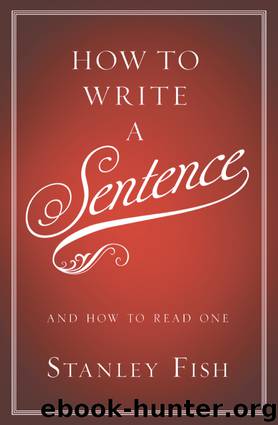How to Write a Sentence by Stanley Fish

Author:Stanley Fish
Language: eng
Format: epub
Publisher: HarperCollins
CHAPTER 7
The Satiric Style: The Return of Content
Of course those who are virtuosi in the art aren’t just doing finger exercises, practicing scales until they can play them with eyes closed. They’ve already done that as a preliminary to writing in the service of an intention, and that intention will be substantive, a matter of content—the intention to praise or blame or reveal or complicate or exhort or rejoice or ponder or meditate or lament or anatomize or deconstruct (pardon the word) or “justify the ways of God to Man.” While formal devices are limited in number, contents are not; a book surveying or anatomizing them would go on forever (as, for example, Robert Burton’s Anatomy of Melancholy, written over many decades, threatens to). So I’m arbitrarily going to choose one kind of content to serve as a bridge between the largely formal part of this book, the how-to-write part, and the more relaxed part, the how-to-read-and-appreciate part.
I choose satire, the art in which “human vice or folly is attacked through irony, derision or wit.” That is a dictionary definition, and there are more sophisticated ones available in the literature, but it will do. It places satire somewhere between direct brutal invective and mild sarcasm. Satire is less direct than the former and more cutting than the latter. It doesn’t quite come out and say what it is saying, and what it is saying is often devastating. It is a mode of writing characterized by great control of tone over the length of sentences, paragraphs, and sometimes entire volumes. Satire is obviously a content category—its content is cynicism, dyspepsia, disgust, anger—but there’s a lot of formal skill in writing satire, so our training in forms will continue.
Masters of satire and satiric wit write sentences that deliver their sting in stages; just when the reader thinks he knows what point has been made and at whose expense, the thing opens up to claim its victim or victims more intensely. Here is an example from J. L. Austin’s How to Do Things with Words (1962). Austin is cautioning readers not to be impatient with the slow unfolding of his argument:
And we must at all costs avoid over-simplification, which one might be tempted to call the occupational disease of philosophers if it were not their occupation.
The sentence begins with a simple statement of an imperative: avoid oversimplification. The style is serious, even sober, flat. Things get more complicated in the sentence’s second stage; the key is the relative clause “which one might be tempted.” Suddenly the stakes are higher. Before we know what the temptation is, we know that “one” should not yield to it, and we want not to be that one. When the temptation is named—to call oversimplification the disease of philosophers—we can relax, because the spotlight has been taken away from us and turned on philosophers, who must take care not to oversimplify, a fault to which they are apparently susceptible. But then we are drawn back in by the third stage, which snaps out at both readers and philosophers.
Download
This site does not store any files on its server. We only index and link to content provided by other sites. Please contact the content providers to delete copyright contents if any and email us, we'll remove relevant links or contents immediately.
| Booksellers & Bookselling | General |
| History of Books |
4 3 2 1: A Novel by Paul Auster(12393)
The handmaid's tale by Margaret Atwood(7764)
Giovanni's Room by James Baldwin(7346)
Asking the Right Questions: A Guide to Critical Thinking by M. Neil Browne & Stuart M. Keeley(5775)
Big Magic: Creative Living Beyond Fear by Elizabeth Gilbert(5772)
Ego Is the Enemy by Ryan Holiday(5450)
The Body: A Guide for Occupants by Bill Bryson(5097)
On Writing A Memoir of the Craft by Stephen King(4944)
Ken Follett - World without end by Ken Follett(4732)
Adulting by Kelly Williams Brown(4574)
Bluets by Maggie Nelson(4556)
Eat That Frog! by Brian Tracy(4540)
Guilty Pleasures by Laurell K Hamilton(4449)
The Poetry of Pablo Neruda by Pablo Neruda(4109)
Alive: The Story of the Andes Survivors by Piers Paul Read(4033)
White Noise - A Novel by Don DeLillo(4010)
Fingerprints of the Gods by Graham Hancock(4004)
The Book of Joy by Dalai Lama(3986)
The Bookshop by Penelope Fitzgerald(3853)
